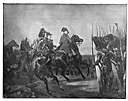warring
Also found in: Thesaurus, Medical, Legal, Idioms, Encyclopedia, Wikipedia.
war
(wôr)n.
1.
a. A state of open, armed, often prolonged conflict carried on between nations, states, or parties.
b. The period of such conflict.
c. The techniques and procedures of war; military science.
2.
a. A condition of active antagonism or contention: a war of words; a price war.
b. A concerted effort or campaign to combat or put an end to something considered injurious: the war against acid rain.
intr.v. warred, war·ring, wars
Idiom: 1. To wage or carry on warfare.
2. To be in a state of hostility or rivalry; contend.
at war
In an active state of conflict or contention.
[Middle English werre, from Old North French, of Germanic origin; see wers- in Indo-European roots.]
Word History: War can be traced back to the Indo-European root *wers-, "to confuse, mix up." In the Germanic family of the Indo-European languages, this root gave rise to several words having to do with confusion or mixture of various kinds. One was the noun *werza-, "confusion," which in a later form *werra- was borrowed into Old French, probably from Frankish, a largely unrecorded Germanic language that contributed about 200 words to the vocabulary of Old French. From the Germanic stem came both the form werre in Old North French, the form borrowed into English in the 1100s, and guerre (also the source of guerrilla) in the rest of the Old French-speaking area. Both forms meant "war." Meanwhile another form derived from the same Indo-European root had developed into a word denoting a more benign kind of mixture, Old High German wurst, meaning "sausage." Modern German Wurst was borrowed into English in the 1800s.
American Heritage® Dictionary of the English Language, Fifth Edition. Copyright © 2016 by Houghton Mifflin Harcourt Publishing Company. Published by Houghton Mifflin Harcourt Publishing Company. All rights reserved.
warring
(ˈwɔːrɪŋ)adj
1. involved in a war; involved in fighting
2. involved in a quarrel or dispute
3. conflicting
Collins English Dictionary – Complete and Unabridged, 12th Edition 2014 © HarperCollins Publishers 1991, 1994, 1998, 2000, 2003, 2006, 2007, 2009, 2011, 2014
ThesaurusAntonymsRelated WordsSynonymsLegend:
Switch to new thesaurus
| Adj. | 1. |  warring - engaged in war; "belligerent (or warring) nations" warring - engaged in war; "belligerent (or warring) nations"unpeaceful - not peaceful; "unpeaceful times"; "an unpeaceful marriage" |
Based on WordNet 3.0, Farlex clipart collection. © 2003-2012 Princeton University, Farlex Inc.
warring
adjective hostile, fighting, conflicting, opposed, contending, at war, embattled, belligerent, combatant, antagonistic, warlike, bellicose, ill-disposed He has called on the country's warring factions to end hostilities.
Collins Thesaurus of the English Language – Complete and Unabridged 2nd Edition. 2002 © HarperCollins Publishers 1995, 2002
Translations
warring
[ˈwɔːrɪŋ] ADJ [interests] → opuesto; [nations, armies] → en guerra; [factions, parties] → enfrentado; [parents, families] → enfrentado; [emotions] → contradictorio, encontradoCollins Spanish Dictionary - Complete and Unabridged 8th Edition 2005 © William Collins Sons & Co. Ltd. 1971, 1988 © HarperCollins Publishers 1992, 1993, 1996, 1997, 2000, 2003, 2005
warring
[ˈwɔːrɪŋ] adj (= at war) [nations] → en guerre
(= in conflict) [interests] → contradictoire; [parties, factions] → rival(e)
Collins English/French Electronic Resource. © HarperCollins Publishers 2005
warring
adj
(lit) parties, sides → gegnerisch; nations → Krieg führend; interests, ideologies → gegensätzlich; factions → sich bekriegend
(fig) parents, couple → sich bekriegend
Collins German Dictionary – Complete and Unabridged 7th Edition 2005. © William Collins Sons & Co. Ltd. 1980 © HarperCollins Publishers 1991, 1997, 1999, 2004, 2005, 2007
Collins Italian Dictionary 1st Edition © HarperCollins Publishers 1995